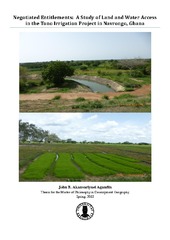| dc.description.abstract | The economy of Northern Ghana is largely agrarian with over 70% of the population engaged in agriculture and agricultural based livelihood activities (GSS, 2012). Agriculture is however characterised by poor yields as a result of erratic rains and poor soils. Irrigation offers greater opportunities for livelihoods security and poverty reduction through all-year-round cultivation and higher yields. Creating irrigation facilities and allocating land and water rights however raises many land tenure issues involving many social actors. In the Tono Irrigation Scheme in the Upper East region, management has to work through and against several actors to institutionalize authority and resource control. These actors include; farmers, chiefs, family landholders, earthpriests (tigatiina/tengnyam), local politicians, and village committee executives. Using an extended entitlement framework, this study investigates how power play and competition between the various actors affect the distribution of land and water resources. The framework links both macro and micro levels of analysis, matching external and higher level forces to internal, local level dynamics that affect access to resources. Further insight is drawn from the dynamics of land rights and the exercise of compulsory acquisition by government to acquire land for development projects in Ghana as well as the role of agricultural policies and interventions and market forces in shaping resource access behaviour. The study found that there is a gap between statutory/formal institutions and local practices - pre-existing customary land tenure and informal land transactions. This opens the door for manipulation by powerful actors. Big men', politicians, local chiefs and other customary landholders try to circumvent one set of rules with the other in order to support claims and counter claims for control or access rights to land and water resources. In the process, resource allocation is skewed in favour of these powerful actors who have privileged access to scheme lands whilst local small-scale farmers, women and young people are generally disadvantaged and lose out. Competition also borders on the legitimate authority to mediate conflicts on project lands as local chiefs compete with Village Committee executives as well as the authority of management not only over scheme lands but also for the allegiance of local farmers. The study suggests that as many irrigation users tend to obtain access to land through diverse combinations of statutory and customary entitlements, local land tenure issues must be properly taken into account in establishing irrigation facilities and regulations should aim to build on local tenure systems rather than attempting to replace them. Existing inequalities in customary tenure systems must also be recognised and attempts made to cater for the interest of weaker social groups. Fieldwork was done over a three month period from June to August, 2014. Qualitative data was collected through Individual and Key Informant interviews, Group Interviews, field observations, photo elicitation and informal discussions. Forty five (45) individual informants drawn from all the actor groups were interviewed using a semi structured interview guide. Each interview lasted a minimum of one (1) hour. Officials and Key informants were interviewed on more than one occasion. Two group interviews were also conducted in two communities. | en_US |
